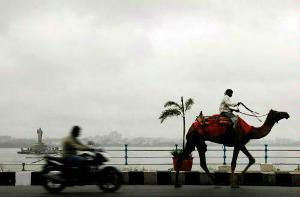 New Delhi, Nov 27: The cyclonic storm Lehar in the Bay of Bengal today moved further towards the Andhra Pradesh coast and could cross it tomorrow causing extensive damage, officials said.
New Delhi, Nov 27: The cyclonic storm Lehar in the Bay of Bengal today moved further towards the Andhra Pradesh coast and could cross it tomorrow causing extensive damage, officials said.
The "very severe" cyclonic storm was now centered about 650 km east-southeast of Machillipatnam and 600 km east-southeast of Kakinada in the state, the India Meteorological Department (IMD) said.
"The cyclone moved west-northwestward with a speed of 15 kmph during the past six hours," the IMD said.
The IMD has forecast heavy to very heavy rainfall from Wednesday evening over coastal Andhra Pradesh and Yanam district of Puducherry.
"(The) intensity would gradually increase at most places with heavy to very heavy rainfall at a few places and isolated extremely heavy rainfall over coastal Andhra Pradesh and Yanam district Thursday," the IMD said.
It warned of extensive damage to mud houses and agricultural crops, and disruption of power and communication lines as well as rail and road traffic.
IMD has called for total suspension of fishing operations.
It also called for mobilizing evacuation from coastal areas and judicious regulation of rail and road traffic and asked people in affected areas to remain indoors.
An IMD bulletin said squally winds speed reaching 45-55 kmph gusting to 65 kmph would commence along and off Andhra Pradesh and south Odisha coasts Wednesday evening.
The wind speed would be 100-110 kmph gusting to 120 kmph over Vizianagaram and Prakasham districts of Andhra Pradesh at the time of landfall.
The sea would be rough to very rough from Wednesday evening and become "phenomenal" Thursday.
The IMD said the storm surge with height of about two-three metres above astronomical tide would inundate low lying areas of West and East Godavari, Guntur and Krishna districts of Andhra and Yanam.
Lehar will be the second cyclone to hit Andhra coast. Helen hit the coast near Machilipatnam last week killing six people.
Cyclone Phailin and heavy rains last month claimed 58 lives and damaged crops over 13 lakh hectares.





Comments
Add new comment